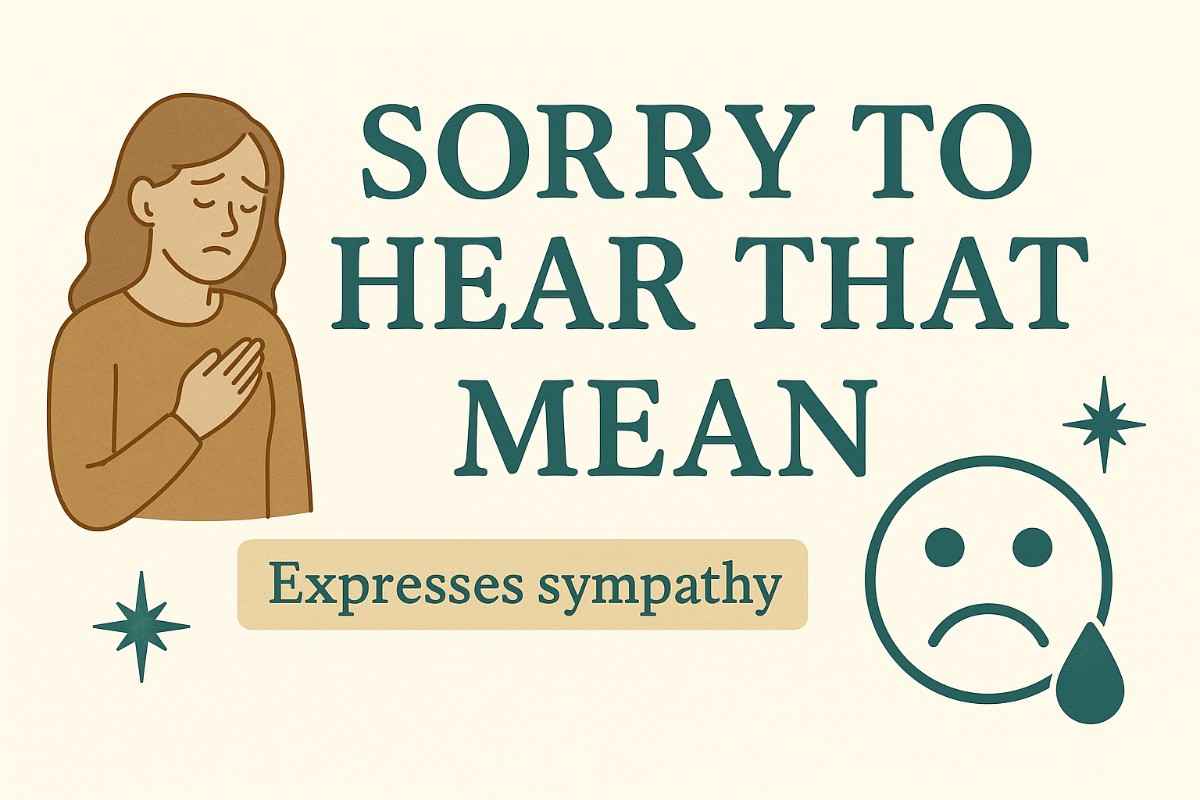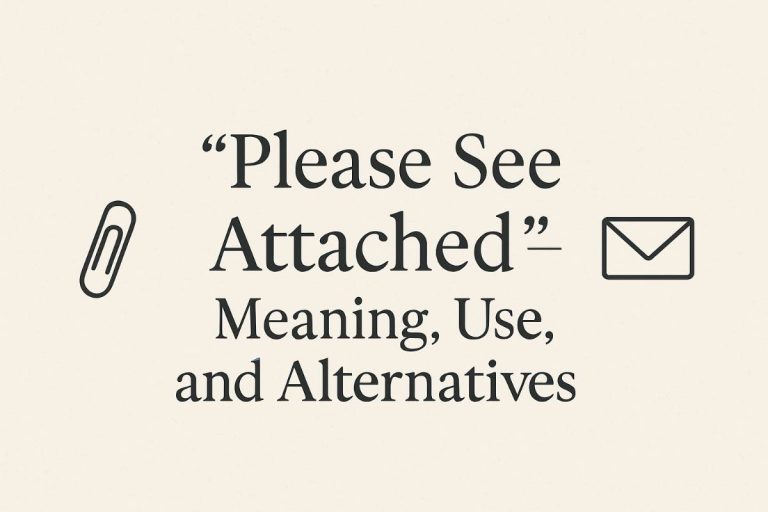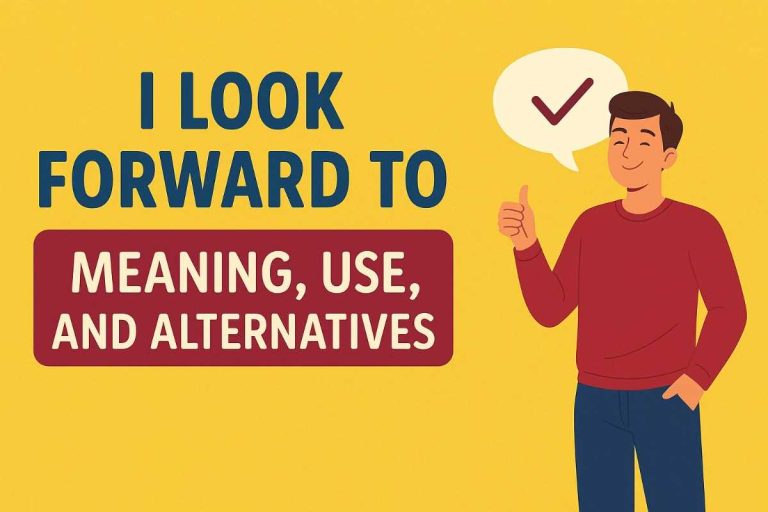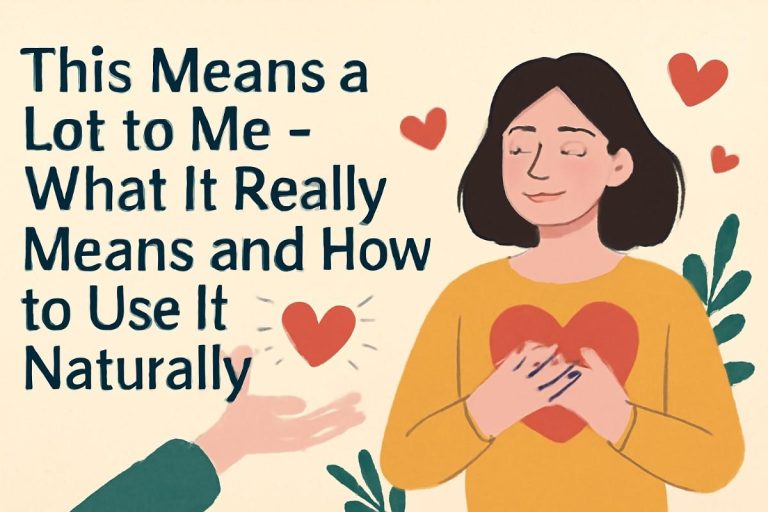“Sorry to Hear That” – Definition, Usage & Examples
We’ve all heard it: someone says, “Sorry to hear that,” and we nod. But have you ever stopped to think what it actually means? It’s one of those phrases we toss around. It shows up in conversations, emails, even text messages. People use it when something unfortunate happens. But sometimes, it can feel automatic—even vague.
So, what does it really mean? And how should you use it? More importantly, how do you respond to it? Whether you’re on the giving or receiving end, understanding the phrase can make your communication more thoughtful.
What Does “Sorry to Hear That” Really Mean?
Let’s break it down. “Sorry to hear that” is a way of expressing empathy. It’s not an apology in the literal sense. You’re not saying, “I caused this, and I feel bad.” Instead, you’re showing emotional support. You’re acknowledging someone’s pain or trouble.
Think of it as a verbal pat on the back. You’re telling the person, “I recognize that you’re hurting or dealing with something unpleasant. And I care.”
It’s usually said when someone shares bad news. Maybe their dog passed away. Maybe they lost their job. Maybe something smaller, like missing a train or spilling coffee on a laptop. Whatever it is, “Sorry to hear that” serves as a soft cushion for the blow.
When and Why People Say “Sorry to Hear That”
People use this phrase in a range of situations. It’s versatile. From serious events to minor frustrations, it fits many tones.
Let’s say a coworker mentions a canceled vacation. You might say, “Oh, sorry to hear that. That stinks.”
Now imagine a friend tells you their grandparent died. You’d still say, “I’m really sorry to hear that.” But your tone would shift. It’s softer, more serious.
So, why do we use it?
- To show compassion. Even if you can’t fix the problem, you want to be there for the person.
- To stay connected. It helps maintain emotional closeness.
- To keep things polite. Sometimes, we don’t know what else to say. This phrase is a gentle placeholder.
- To avoid silence. In awkward or sad moments, silence can feel worse than saying something basic.
But here’s a catch: if used too often or without real feeling, it can sound empty. That’s why tone and timing matter.
Recommended for You – Received With Thanks: Meaning, Usage, and Examples
How to Respond to “Sorry to Hear That”
When someone says it to you, how should you react?
Well, it depends on your mood and the situation. But here are some responses that fit different moments:
- “Thanks, I appreciate it.” (Short and polite.)
- “Yeah, it’s been tough, but I’m getting through it.” (Acknowledging the situation.)
- “I know, right? Such bad timing.” (If it’s a light complaint.)
- “It means a lot that you said that.” (More heartfelt.)
You don’t have to say much. Most people just want to offer comfort, not start a long conversation. But if you feel like opening up, this can be an invitation.
25 Alternatives to Saying “Sorry to Hear That”
Looking to say something different? Sometimes, “Sorry to hear that” can feel too generic. Here are 25 alternatives. Some are more formal, others more casual. Pick what suits the tone.
| Alternative Phrase | Meaning | Mood |
|---|---|---|
| That sounds really tough. | Acknowledges difficulty and expresses empathy. | Compassionate |
| I can’t imagine how hard that must be. | Expresses sympathy and recognition of the person’s struggle. | Gentle/Empathetic |
| That must’ve been so difficult for you. | Validates the person’s emotions and situation. | Warm/Reassuring |
| I’m here for you. | Offers emotional support and presence. | Supportive |
| That’s really upsetting—I’m so sorry you’re dealing with that. | Expresses sympathy with sincerity. | Sincere/Heavy |
| Ugh, that’s awful. | Expresses strong emotional reaction; informal. | Relatable/Casual |
| That’s heartbreaking. | Acknowledges emotional weight and sadness. | Tender |
| I wish you didn’t have to go through that. | Expresses compassion and wishful kindness. | Comforting |
| I’m thinking of you. | Shows care without being intrusive. | Thoughtful |
| That sucks—I hate that for you. | Casual but genuine way to express empathy. | Informal/Genuine |
| I hope things get better soon. | Expresses hope and forward-looking support. | Uplifting |
| Please let me know if you need anything. | Offers practical help while acknowledging pain. | Kind/Helpful |
| That’s so unfair. | Validates injustice in the situation. | Assertive/Empathetic |
| I’m sending love your way. | Emotional gesture of care and warmth. | Soothing |
| You’re not alone in this. | Reassures that they have support. | Reassuring |
| I can’t believe you’re dealing with this. | Expresses shock and empathy. | Empathic/Concerned |
| That really hurts to hear. | Shares emotional impact, signals empathy. | Sensitive |
| It’s okay to feel that way. | Normalizes the person’s emotions. | Validating |
| You didn’t deserve that. | Acknowledges pain and defends the person’s dignity. | Affirming |
| That must’ve shaken you up. | Recognizes the emotional impact. | Understanding |
| I’m really sorry you’re going through this. | A direct but warmer version of the original phrase. | Sincere |
| Wow, I’m really feeling for you right now. | Conveys active emotional empathy. | Heartfelt |
| It’s hard to know what to say, but I care. | Honest admission, paired with emotional support. | Honest/Genuine |
| My heart goes out to you. | Traditional but warm expression of sympathy. | Classic/Warm |
| That’s a lot to carry—how are you holding up? | Acknowledges burden, opens space for dialogue. | Caring/Inviting |
Notice how varied they are. You can match your response to the person and the moment. Some lean toward comfort, others offer support or even a chance to talk more.
Conclusion
“Sorry to hear that” is simple. But it’s not meaningless. It carries empathy, even if the words are brief. Still, you don’t have to rely on it every time. You’ve got options—more than you might think.
Being genuine is what counts. Say what feels real, even if it’s just a few words. People remember kindness. Even small kindness.
So the next time you hear or say, “Sorry to hear that,” pause for a beat. Feel the weight of the words. Because sometimes, the simplest phrases are the ones that carry the most heart.







